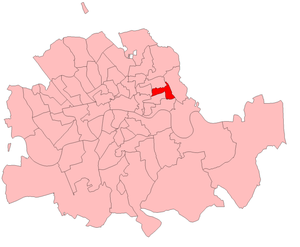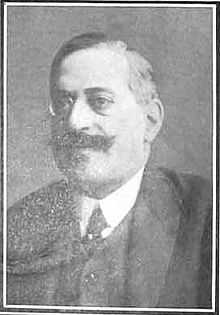Mile End by-election, 1905

The Mile End by-election was a Parliamentary by-election for the seat of Mile End, Tower Hamlets, in the east end of London. It returned one Member of Parliament to the House of Commons of the United Kingdom, elected by the first past the post voting system.
Vacancy
Spencer Charrington had been Conservative MP for the seat of East Dorset since the seats creation at the 1885 General Election. He died on 11 December 1904.
Electoral history
Carrington easily held the seat at the last election, with an increased majority;
| General Election 1900: Tower Hamlets, Mile End[1]
Electorate 5,915 | |||||
|---|---|---|---|---|---|
| Party | Candidate | Votes | % | ±% | |
| Conservative | Spencer Charrington | 2,440 | 65.6 | +4.5 | |
| Liberal | Charles Goddard Clarke | 1,280 | 34.4 | -4.5 | |
| Majority | 1160 | 31.2 | +9.0 | ||
| Turnout | 5,915 | 62.9 | -7.3 | ||
| Conservative hold | Swing | +4.5 | |||
Candidates
- The local Unionist Association selected 43 year-old Liberal Unionist Harry Levy-Lawson as their candidate to defend the seat. He was the son and heir of Baron Burnham. Levy-Lawson was looking to make a return to parliament after a break of ten years. He had sat as a Liberal for St Pancras West from 1885-1892 and for Cirencester from 1893 until his defeat in 1895. He had also sat on the London County Council representing St Pancras West from 1889-1892.

- With a general election expected to take place in the near future, Charles Goddard Clarke, who had been the Liberal candidate last time had been selected to contest the seat of Peckham. The local Liberal Association had to choose a new candidate and selected 38 year-old businessman Bertram Straus as their candidate to challenge for the seat. Straus was well known in the constituency as he was one of the two sitting members who represented Mile End on the London County Council. In fact Strauss had represented Mile End since 1898, winning three elections in the process. Straus also had experience of fighting parliamentary elections having contested Marylebone West at the 1900 General Election.[2]
- The Social Democratic Federation wanted to contest the election but could not secure a willing candidate.[3]
Campaign
Polling Day was fixed for the 12 January 1905, just 32 days after the previous MP died.
The Unionist Governments aborted 1904 Aliens Bill featured in the campaign. The Unionist campaign put the Aliens Bill at the centre of their plans.[4] The Liberal candidate, Straus, who had at first followed party policy in opposing it, later sought to distance himself from the position the Liberal party took in opposing the measure. He declared that he was in favour of excluding "undesirable" aliens.[5] This was understood to target Jewish immigration from Eastern Europe. There was quite a large Jewish community in Mile End. Given that Straus was himself a Jew, this might have seemed an odd position for him to take. There had in fact been a reduction of over 500 voters in Mile End compared with the figures of 1900.
Result
The Liberals gained the seat from the Unionists;
| Mile End by-election, 1905[6]
Electorate 5,380 | |||||
|---|---|---|---|---|---|
| Party | Candidate | Votes | % | ±% | |
| Liberal Unionist | Hon. Harry Lawson Webster Levy-Lawson | 2,138 | 50.9 | -14.7 | |
| Liberal | Bertram Stuart Straus | 2,060 | 49.1 | +14.7 | |
| Majority | 78 | 1.8 | -29.4 | ||
| Turnout | 5,380 | 78.0 | +15.1 | ||
| Liberal Unionist hold | Swing | -14.7 | |||
Straus revealed that he felt that Liberal party opposition to the Aliens Bill may have robbed him of the chance to pull off a sensational victory.[7] The Unionist government was able to force through the Aliens Act 1905 later that year.
Aftermath
When a general election was held in the following year, Straus again faced Levy-Lawson at Mile End and managed to unseat him to become member of parliament.
| General Election 1906: Tower Hamlets, Mile End[8]
Electorate 5,419 | |||||
|---|---|---|---|---|---|
| Party | Candidate | Votes | % | ±% | |
| Liberal | Bertram Stuart Straus | 2,295 | 51.4 | +2.3 | |
| Liberal Unionist | Hon. Harry Lawson Webster Levy-Lawson | 2,169 | 48.6 | -2.3 | |
| Majority | 126 | 2.8 | 4.6 | ||
| Turnout | 5,419 | 82.4 | +4.4 | ||
| Liberal gain from Liberal Unionist | Swing | +2.3 | |||
References
- ↑ Craig, F.W.S. (1974). British parliamentary election results 1885-1918 (1 ed.). London: Macmillan.
- ↑ ‘STRAUS, Bertram Stuart’, Who Was Who, A & C Black, an imprint of Bloomsbury Publishing plc, 1920–2007; online edn, Oxford University Press, Dec 2007 accessed 8 Feb 2014
- ↑ "Election Intelligence." Times [London, England] 2 Jan. 1905: 8. The Times Digital Archive. Web. 8 Feb. 2014.
- ↑ "Election Intelligence." Times [London, England] 13 Jan. 1905: 8. The Times Digital Archive. Web. 8 Feb. 2014.
- ↑ Illustrated London News [London, England] 21 Jan. 1905: 80. Illustrated London News. Web. 8 Feb. 2014.
- ↑ Craig, F.W.S. (1974). British parliamentary election results 1885-1918 (1 ed.). London: Macmillan.
- ↑ Illustrated London News [London, England] 21 Jan. 1905: 80. Illustrated London News. Web. 8 Feb. 2014.
- ↑ Craig, F.W.S. (1974). British parliamentary election results 1885-1918 (1 ed.). London: Macmillan.
| ||||||||||||||||||||||||||||||